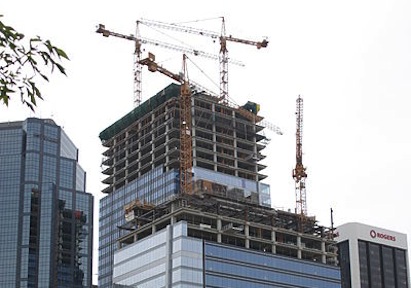Reed Construction Data announced its December Expansion Index stood at 1.48, indicating overall construction in the United States is expected to grow over the next 12 months.
“The positive signs of growth are encouraging and align with other economic data,” said Bernard Markstein, U.S. Chief Economist, Reed Construction Data. “With an Expansion Index greater than 1 in 41 states plus the District of Columbia, the expected improvement in construction appears widespread across the country.” The top five states expected to see an expanding construction market: North Dakota, Rhode Island, Montana, Virginia, Utah.
The Expansion Index is a monthly measure of expectations for the construction marketplace over the upcoming 12-18 months, based on the value of projects in the planning pipeline. A reading greater than 1 indicates construction volume is expected to expand.
In addition to an overall measure of U.S. construction, Reed uses the Expansion Index to track expected construction volume for every state and more than 360 Metropolitan Statistical Areas.
According to Markstein, multiple factors are supporting the positive signal.
“Many pieces are falling into place for a moderately faster-growing economy,” stated Markstein. “Companies are experiencing rising demand. A federal budget deal was signed into law. Residential construction continues to improve. Europe is slowly working its way out of recession. These and other positives mean the Reed Expansion Index is likely to remain well above 1 for several months–an indication that construction activity will rise throughout the year.”
The Expansion Index is a ratio of the value of projects in the planning phase over the value of the projects estimated to be still under construction in a defined geography and/or building segment. The relationship says if more in the pipeline than underway, the volume will increase in the future if that ratio is greater than 1. The data covered includes non-residential and multifamily residential construction.
To view the Expansion Index, visit www.reedconstructiondata.com/market-intelligence/expansion-index.
| 20 Fastest-growing MSAs | |
|---|---|
| MSA | EI rating |
| Duluth, MN-WI Durham, NC El Centro, CA Evansville, IN-KY Flagstaff, AZ Flint, MI Grand Forks, ND-MN Greenville, NC Laredo, TX Logan, UT-ID Missoula, MT Muskegon-Norton Shores, MI Providence-New Bedford-Fall River, RI-MA Salem, OR Waterloo-Cedar Falls, IA Clarksville, TN-KY VA Beach-Norfolk-Newport News, VA-NC Columbia, MO Baton Rouge, LA Greensboro-High Point, NC |
>10 >10 >10 >10 >10 >10 >10 >10 >10 >10 >10 >10 >10 >10 >10 9.56 7.75 7.67 6.91 6.77 |
About Reed Construction Data
Reed Construction Data is a trusted source for detailed, accurate, and up-to-date information on private and public construction projects across the United States and Canada. Reed’s data collection teams leverage strong industry relationships, innovative technology, and third-party data sources to deliver timely and accurate information on projects, companies, and contacts and daily updates for all types of general and civil construction. For more information, visit www.reedconstructiondata.com.
Related Stories
| Aug 11, 2010
City of Anaheim selects HOK Los Angeles and Parsons Brinckerhoff to design the Anaheim Regional Transportation Intermodal Center
The Los Angeles office of HOK, a global architecture design firm, and Parsons Brinckerhoff, a global infrastructure strategic consulting, engineering and program/construction management organization, announced its combined team was selected by the Anaheim City Council and Orange County Transportation Authority (OCTA) to design phase one of the Anaheim Regional Transportation Intermodal Center.
| Aug 11, 2010
GBCI launches credentialing maintenance program for current LEED APs
The Green Building Certification Institute (GBCI) launched a credentialing maintenance program (CMP) for LEED APs and Green Associates, ensuring that LEED professional credentials will remain relevant and meaningful in a rapidly evolving marketplace.
| Aug 11, 2010
Construction employment shrinks in 319 of the nation's 336 largest metro areas in July, continuing months-long slide
Construction workers in communities across the country continued to suffer extreme job losses this July according to a new analysis of metropolitan area employment data from the Bureau of Labor Statistics released today by the Associated General Contractors of America. That analysis found construction employment declined in 319 of the nation’s largest communities while only 11 areas saw increases and six saw no change in construction employment between July 2008 and July 2009.
| Aug 11, 2010
Green consultant guarantees LEED certification or your money back
With cities mandating LEED (Leadership in Energy and Environmental Design) certification for public, and even private, buildings in growing numbers, an Atlanta-based sustainability consulting firm is hoping to ease anxieties over meeting those goals with the industry’s first Green Guaranteed.
| Aug 11, 2010
Architecture Billings Index bounces back after substantial dip
Exhibiting a welcome rebound following a 5-point dip the month prior, the Architecture Billings Index (ABI) was up almost 6 points in July. As a leading economic indicator of construction activity, the ABI reflects the approximate nine to twelve month lag time between architecture billings and construction spending. The American Institute of Architects (AIA) reported the July ABI rating was 43.1, up noticeably from 37.7 the previous month.
| Aug 11, 2010
Rafael Vinoly-designed East Wing opens at Cleveland Museum of Art
Rafael Vinoly Architects has designed the new East Wing at the Cleveland Museum of Art (CMA), Ohio, which opened to the public on June 27, 2009. Its completion marks the opening of the first of three planned wings.
| Aug 11, 2010
National Association of Governors adopts AIA policy of reaching carbon neutrality in buildings by 2030
As part of their comprehensive national Energy Conservation and Improved Energy Efficiency policy, the National Association of Governors (NGA) has adopted the promotion of carbon neutral new and renovated buildings by 2030 as outlined by the American Institute of Architects (AIA).







